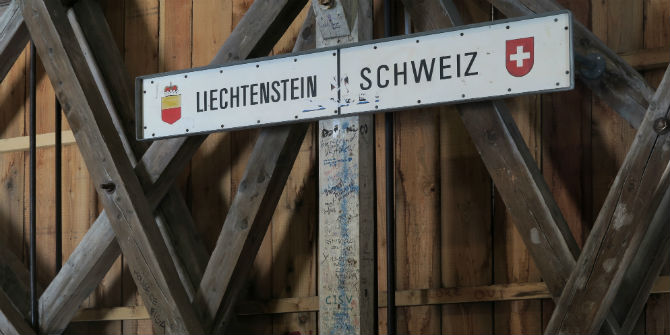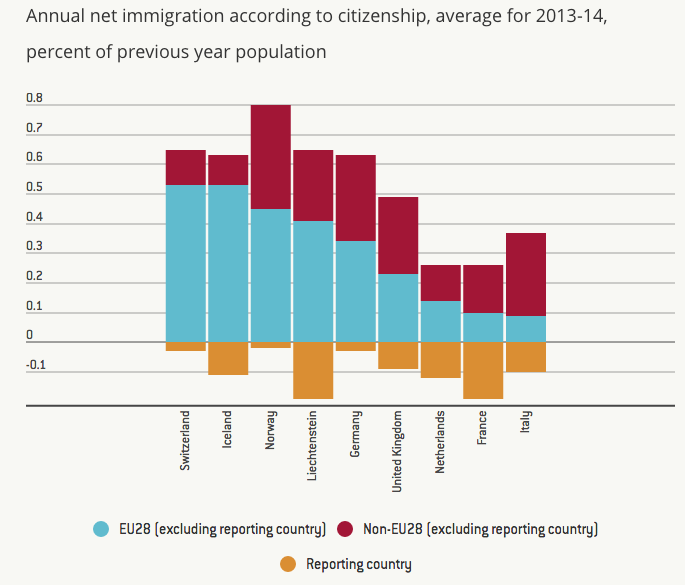 Theresa May’s government has not yet indicated the kind of new relationship it wishes to achieve with the EU. However, a crucial element of any new relationship will concern access to the EU’s single market. Four non-EU countries (Iceland, Liechtenstein and Norway through the European Economic Area; Switzerland through bilateral agreements) have wide-ranging access to the single market. In a post that first appeared at Bruegel.org, Zsolt Darvas finds Norway’s current net financial contribution to the EU is similar to the UK’s. Switzerland and Liechtenstein pay surprisingly little, while Iceland is a net beneficiary. Relative to their population, Switzerland, Norway, Iceland and Liechtenstein received about twice as large an inflow of EU immigrants as the UK. These countries also have to adopt the vast majority of EU regulation to gain access to the single market. Few of these elements is likely to appeal to Brexit campaigners.
Theresa May’s government has not yet indicated the kind of new relationship it wishes to achieve with the EU. However, a crucial element of any new relationship will concern access to the EU’s single market. Four non-EU countries (Iceland, Liechtenstein and Norway through the European Economic Area; Switzerland through bilateral agreements) have wide-ranging access to the single market. In a post that first appeared at Bruegel.org, Zsolt Darvas finds Norway’s current net financial contribution to the EU is similar to the UK’s. Switzerland and Liechtenstein pay surprisingly little, while Iceland is a net beneficiary. Relative to their population, Switzerland, Norway, Iceland and Liechtenstein received about twice as large an inflow of EU immigrants as the UK. These countries also have to adopt the vast majority of EU regulation to gain access to the single market. Few of these elements is likely to appeal to Brexit campaigners.

Three indicators may be indicative of the conditions which the UK would have to fulfil if it wishes to get similar access to the single market:
- Net financial contribution to the EU;
- Net inflow of EU immigrants;
- Adoption of EU law.
The main contribution of this blog post is a precise comparison of the four non-EU countries (partly based on novel data not available elsewhere) with the UK and some other larger EU countries along the above factors.
Financial contribution to the EU
Social and economic cohesion in the European Union and the European Economic Area is a goal stipulated in the European Economic Area (EEA) Agreement. Thereby, the three non-EU EEA members contribute financially to this goal through various financial mechanisms. Switzerland also contributes to various projects designed to reduce economic and social disparities.
Upon my request, the Directorate-General for Budget of the European Commission kindly provided information about the gross and net financial contributions of the four non-EU countries to the EU (see annex), which allows a proper comparison to EU countries. The table below shows that Iceland was a net beneficiary of EU payments, while the net contributions of Switzerland and Liechtenstein were very small. On the other hand, Norway’s net contribution was similar to the contribution of the United Kingdom: it was somewhat smaller when expressed as a % of GDP, and somewhat larger when expressed in per capita terms.
Annual net financial contribution to the EU
| % GDP | € per capita | |
|---|---|---|
| Iceland | -0.05% | -25 |
| Switzerland | 0.02% | 12 |
| Liechtenstein | 0.03% | 40 |
| Norway | 0.16% | 115 |
| United Kingdom | 0.25% | 79 |
| Italy | 0.29% | 79 |
| France | 0.32% | 100 |
| Netherlands | 0.36% | 140 |
| Germany | 0.39% | 131 |
Note: average of 2008-2014 for EU countries, average of 2014-15 for the four non-EU countries (longer time series are not available).
Sources: calculations based on European Commission data on the EU budget for EU countries, data received from the Directorate-General for Budget of the European Commission for the four non-EU countries upon my request (see annex), Eurostat for GDP andpopulation for all countries except GDP of Liechtenstein, which is based on UN data (see the annex).
It is also noteworthy that both relative to GDP and relative to population, the UK pays less than Germany, France and the Netherlands. The UK even pays less than Italy relative to GDP, despite the fact that Italy is a less developed country than the UK. The reason for the UK’s low financial contribution is primarily related to the UK rebate on the EU budget, which was introduced in 1985 in order to reduce the UK’s contribution.
The net inflow of EU immigrants
Both the European Economic Area agreement and the bilateral agreement with Switzerland ensure the free movement of labour, although Switzerland wishes to renegotiate this. The chart below shows that relative to population, Switzerland, Norway, Iceland and Lichtenstein received about twice as much inflow of EU immigrants as the United Kingdom in 2013-14. Germany also received more EU immigrants than the UK as a percentage of its population, and even more so in terms of the number of people.
Source: author’s calculation based on Eurostat datasets ‘Immigration by five year age group, sex and citizenship [migr_imm1ctz]’, ‘Emigration by five year age group, sex and citizenship [migr_emi1ctz]’ and ‘Population on 1 January by age and sex [demo_pjan]’.
It is noteworthy that immigration from outside the EU was also sizeable in all nine countries included in the chart (note that the data refer to 2013-14, before the recent wave of large inflow of refugees to Europe). In the United Kingdom, more than half of immigrants were non-EU citizens: an inflow which was fully under the control of the UK government. It was therefore a UK decision to let non-EU nationals come to work in the UK, probably because immigrants brought major benefits to the UK economy, as I argued here.
Adoption of EU laws and regulations
Access to the single market requires the adoption of all relevant single market legislation. Furthermore, fullfact.org quotes a Norway government reportwhich says “Norway has incorporated approximately three-quarters of all EU legislative acts into Norwegian legislation” (page 6). And while in principle Norway, as well as other EEA members, may raise reservations, the study concludes (page 8): “Of the more than 6 000 new EU legislative acts that have been incorporated into the EEA Agreement, the use of our right to enter a reservation has only been proposed in connection with 17, and so far we have not entered a reservation in practice, although the first case may be on the horizon.”
Switzerland is also obliged “to take over relevant Community legislation” in the sectors covered by the approximately 100 bilateral agreements that currently exist between the EU and Switzerland.
Summary
While the UK’s strategy toward access of the EU single market after Brexit is unclear, the experience of the four non-EU countries having access to it suggests that the conditions of access may involve:
- Sizeable net financial contribution to the EU budget (Norway pays similar amounts to current UK payments in relative terms, though Switzerland and Liechtenstein pay surprisingly small amounts.);
- Sizeable net inflow of EU workers and their families (relative to population, all four non-EU countries received about twice as many EU immigrants as the UK);
- The adoption of a very large share of EU regulations – without a voice in influencing them.
None of these elements may look attractive to those who campaigned for Brexit.
This post represents the views of the author and not those of the BrexitVote blog, nor the LSE. It first appeared at Bruegel.org, where the annex can be found.
Zsolt Darvas is a Senior Fellow at Bruegel. He is also a Research Fellow at the Institute of Economics of the Hungarian Academy of Sciences and Associate Professor at the Corvinus University of Budapest.








We don’t want access to the Single Market, we don’t want any reference to the single market. If we have anything we would accept a simple Free Trade Agreement with the EU along the lines of that between Singapore, South Korea etc & the EU We do not want the EU imposed on the UK at any level
Oh so do add in the impending deals for Canada an the USA. It will rather put a spanner in your argument, as they say.
There is a good alternative to copying the legislation of other jurisdictions to get access to their markets. A country can offer product or service certification in accordance with a “gold-standard” that incorporates the other jurisdictions’ criteria but which is only applicable on a voluntary basis. At the same time, mandatory requirements for the domestic markets can be reduced, if this is deemed appropriate to reduce costs. Industry thus has the choice between reduced requirements for the domestic market and applying for a “gold-standard” certification that provides in one strike access to many jurisdictions. More on this two tier regulatory approach to be found on my blog http://www.howtoregulate.org in the article “Better than bilateral trade agreements: …”.
A Brexit divorce will take at least two years so it is unlikely anything will change soon in terms of free movement of labor which allows EU citizens to enter the UK to find work and vice-versa. If a different type of trade deal is made, EU citizens could be subject to the immigration system non-EU citizens go through.
I think Joe Thorpe put it well in his post. My vision of Brexit also does not envisage that we pay anything at all to the crooked dishonest and bullying EU. Brexit means Brexit means complete freedom from the EU shambles. There’s a price to pay but we will eventually overcome and stand tall in the world again
How is the EU crooked, dishonest and bullying? The commonly repeated myth about the accounts can easily be discredited by checking online. Is the UK such a small weak country that when the EU (with the agreement of all the member states) says you need to abide by the rules and gives its stance on the negotiations, all the UK (brexiters and foreign owned right wing media) does is squeal about being bullied
Very informative blog. I’m amazed at the number of people who think that trading on WTO rules or spending years getting new trade agreements with less leverage than we have within Europe will bring anything but a reduction in UK living standards. All the supposed benefits are vague and in the far future. It’s like jumping out of a moving car, arguing that while we may sustain some broken bones and concussion we will be much better off if, and when, the car crashes into a brick wall.